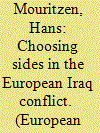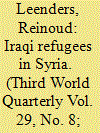| Srl | Item |
| 1 |
ID:
074369


|
|
|
|
|
| Publication |
2006.
|
| Summary/Abstract |
Focusing on the Euro-Atlantic conflict over the Iraq war operation in early 2003 (the 'European Iraq conflict'), the purpose of the present article is to explain the pattern of Atlantic (vs. Continental) predispositions among European countries. It argues that this is the best suited conflict in the post-Cold War era to illuminate this stable and fundamental pattern. Whereas systemic power distribution, size, public opinion, or government ideology all fail to account for the positioning of states in the conflict (and balance of threat applies only modestly), a theory of 'past and present geopolitics' is outlined that seems able to explain states' predispositions and, hence, their positionings in this specific situation. It is remarkable that 'old-fashioned' geopolitical dynamics can be identified even within the Euro-Atlantic zone of 'peace and prosperity'-not only at its fringes, but also in its very heart.
|
|
|
|
|
|
|
|
|
|
|
|
|
|
|
|
| 2 |
ID:
085190


|
|
|
|
|
| Publication |
2008.
|
| Summary/Abstract |
This article explores the implications of the Iraqi refugee crisis for Syria, which is believed to host up to 1.5 million Iraqi refugees. Many policy makers, activists and analysts, sometimes inspired by the conflict repercussions of refugee crises witnessed elsewhere, have warned against the regional security impact of the Iraqi exodus and consequently speculated about a possible spillover of the armed conflicts in Iraq to its neighbours. The article presents an analysis of the characteristics and composition of the Iraqi refugee population and provides an assessment of responses to the refugee crisis in Syria. Its main finding is that fears for a spillover of Iraq's violence cannot be corroborated. The relative absence of refugee violence can be explained in reference to Iraqi refugees themselves. Given their specific demographic and social traits (including age composition, educational levels and professions, and to some extent religious affiliation), in addition to refugees' sectarian segregation, an overwhelming majority of Iraqi refugees are and remain victims of the violence in Iraq; they are unlikely to become its perpetrators abroad.
|
|
|
|
|
|
|
|
|
|
|
|
|
|
|
|